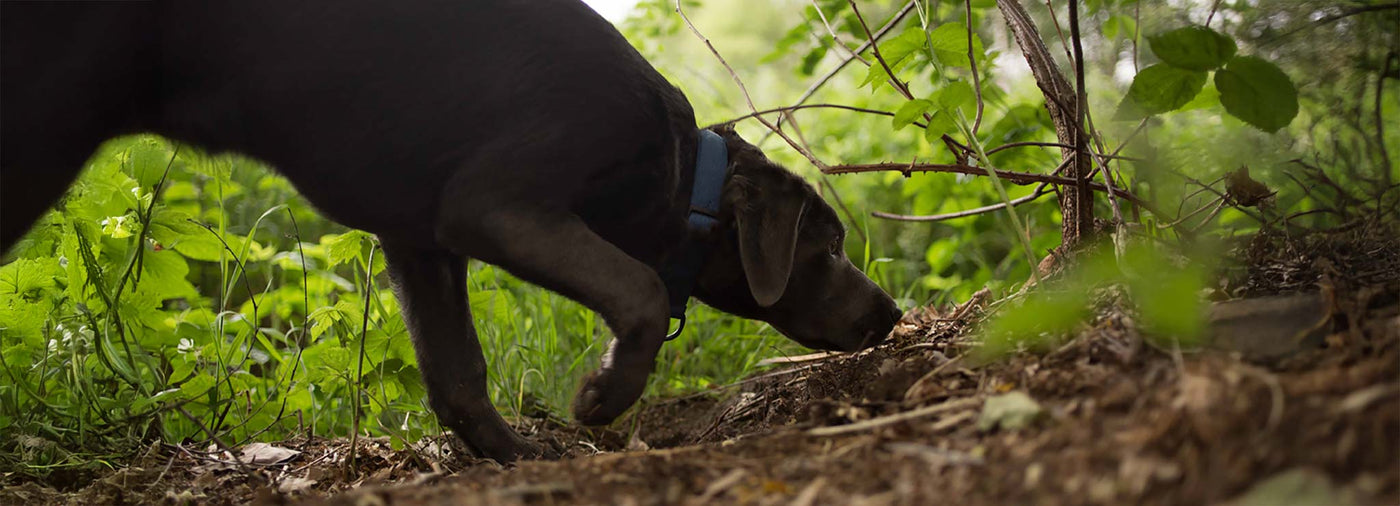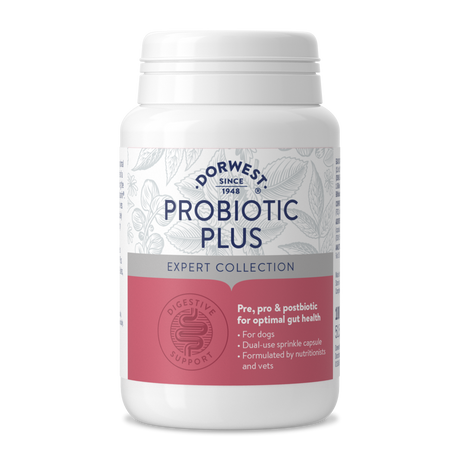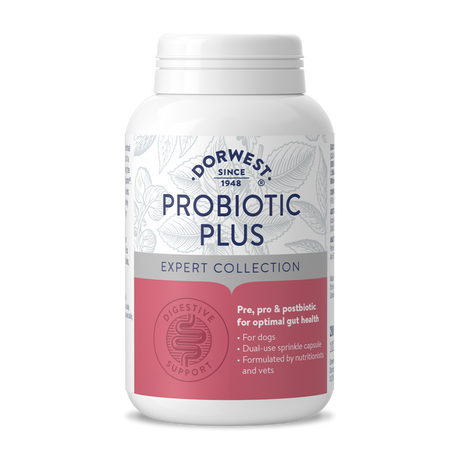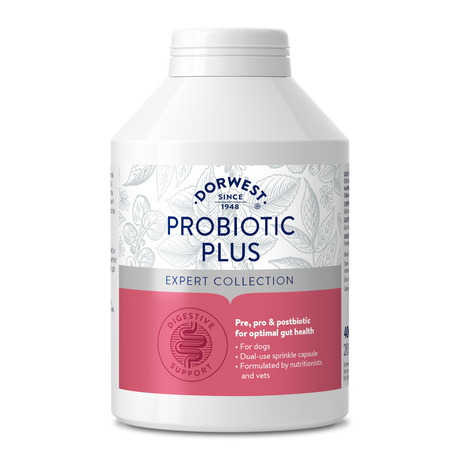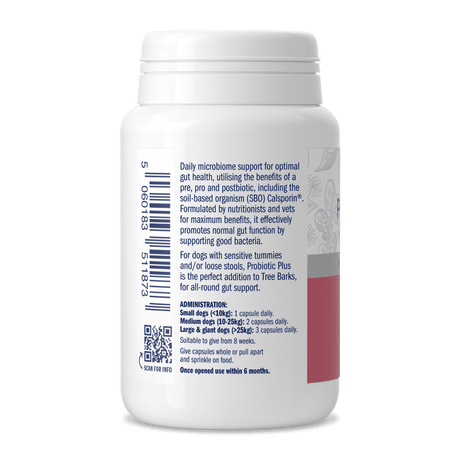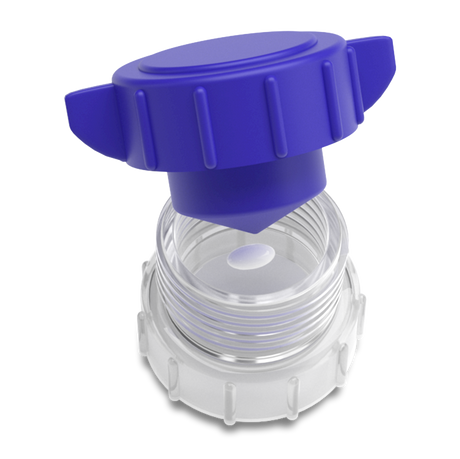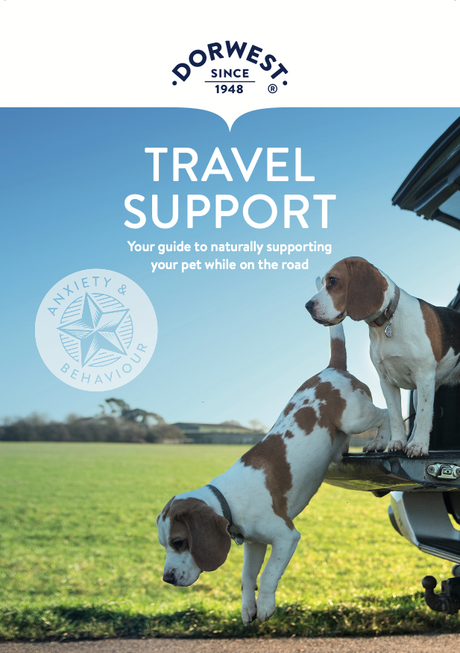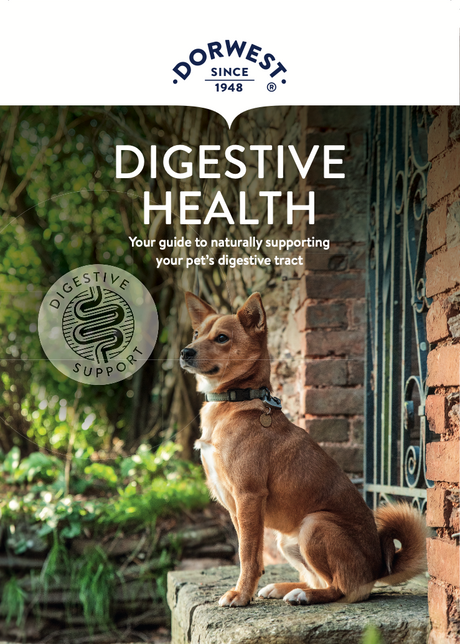It's no secret that many dogs just love to eat poo, from whatever animal they can find - something that seems pretty disgusting to us dog owners! But did you know that around 20% of pups have done it at some point?
Every dog has their own personality and quirks, it's what makes them so special and easy to love. You might know your pet well or are just getting to know them, but the better you understand their behaviour, the more you can help. With the right plan in place and an understanding of the cause, you'll be pleased to hear that this common concern, can be easily be managed!
Read on to learn more about the reasons behind it and what you can do to help.
Key takeaways
- Understanding why: Dogs eat poo for many reasons, from instincts and curiosity to boredom, anxiety, or medical reasons. Knowing the cause helps you address the behaviour effectively.
- It's usually manageable: While gross, poo eating is common and mostly harmless if treated early with training, nutrition, and routines.
- Prevention is key: It's a lot easier to prevent this behaviour before it becomes a frequent habit. Quick clean-up, regular exercise, a balanced diet, and supporting their gut health support with a quality probiotic, like our Probiotic Plus, are all great habits to have.
- Vet support when needed: If poo eating is sudden, frequent, or paired with illness symptoms, consult your local vet to rule out health problems and get proper advice.
Why do dogs eat poop?
The big question to ask is always, "Why is my dog doing this?" Possible reasons include learned habits, loving the taste, mood changes (dogs can feel happy, sad, or bored, just like us), or even an underlying health issue. Once you understand the cause, it becomes much easier to address the behaviour.
Here are seven of the most common causes:
1. Emotions and behaviour
Anxiety in dogs can cause a whole mix of behaviours, and eating poo might be their way of finding a bit of calm when they're feeling anxious, especially if they struggle with separation anxiety.
Stress is pretty similar to anxiety, but tends to hit harder and faster. So, a stressful moment, like loud fireworks noises for some dogs, can trigger them to find ways of coping with what they're feeling at that moment.
Boredom is natural in active dogs that need plenty of both physical and mental exercise, which, of course, can differ depending on your dog's breed and age. Some dogs, such as German Shepherds or excitable puppies, need more to keep them busy than others.
Fear can be pretty consuming, so it's natural that worry about certain situations or punishment can have a negative effect. For instance, some dogs may gobble up their own mess if they're worried about being scolded.
Attention-seeking pops up when dogs realise their actions get a strong reaction from you. They love any kind of attention, good or bad.
2. Hunger
Feeding and hunger are big factors. It's important to provide a balanced diet tailored to your dog's needs; there's no one-size-fits-all. Some dogs may even snack on faeces right after meals, so making sure they get the right nutrition and portion sizes helps keep them happy and healthy. If you're unsure about amounts based on their age, breed, and activity level, the Kennel Club offers helpful guidance.
If you're unsure if your dog is getting the right nutrition from their food or your dog is raw fed, our Keeper's Mix® is a great all-rounder for general health, making sure your pup gets the nutrients they need everyday. For puppies or dogs with sensitive tums, we have an even gentler and milder flavoured version of our best-selling original, Keeper’s Mix® Sensitive - developed to provide the same whole-body benefits and ideal for young dogs and cats, or those with known sensitivities.

3. Genetics
Since dogs are descended from wolves, could their genes play a role? And are some breeds more likely to show this behaviour more than others? Wolves sometimes consume faeces to reduce parasites, an instinct that may have passed to domestic dogs. Evidence on breed differences is mixed, though research suggests retrievers may be more prone. That said, every dog is different so that behaviours will vary.
4. Pregnancy
While there's no direct connection to pregnancy, what you may see is a mum dog's instinct to clean up after her puppies. Don't worry, it's more of a nurturing behaviour that helps the pups by keeping their space clean and supporting them as they grow.
5. Habit and taste
Dogs naturally love to explore, so it's pretty normal for them to try tasting poo, gross as it may sound. Some actually find they enjoy the taste, and over time, this can develop into a habit. If these negative cycles aren't spotted early, they can become ingrained and harder to break.
If your dog has a habit of eating other dogs’ poo, it could be because it still smells a lot like food. Diets high in processed ingredients or flavourings can make it smell more appealing, some dogs may simply mistake it for a tasty treat left on the floor!
6. Training
It's good to remember it's never too late to train or retrain your dog, as a lack of control or poor recall can make stopping habits harder. Training is all about consistency and support before it becomes a regular thing. The RSPCA has some great training tips to help get started.
7. Health-related causes
It's entirely understandable to worry that your dog might have a medical condition if they're showing this behaviour. In some cases, issues like vitamin deficiencies, parasites (worms), or tummy upsets such as sickness and diarrhoea can play a role. Working with your trusted vet is the best way to rule these out and get the right treatment plan started.
Medical reasons why dogs might eat poop
Vitamin deficiency
As a worried dog parent, you might notice your dog is not acting quite themselves. Signs your dog might not be getting enough nutrients from their food include:
- Weight loss
- Hunting for extra food
- Low energy
- Dullcoat
- Becoming a picky eater
This can happen for a range of medical reasons, from common issues like bacterial overgrowth in their intestines to more serious ones like pancreatic insufficiency. Bacterial overgrowth can often be treated quickly with antibiotics or simple diet changes, while pancreatic insufficiency requires digestive enzyme supplements and ongoing vet support. Because every dog is different, it's important to work with your vet to get to the root of the problem and the right treatment plan.
Worms
These nasty bugs steal nutrients from your dog's meals. Grown-up dogs often develop some resistance over time with regular worming. When it comes to puppies, they are more at risk, often picked up from their mum in the womb. The best thing you can do is keep things clean and stick to the recommended worming routine for pups to help keep them protected.
Sickness and diarrhoea
Dogs can sometimes pick up a sickness bug, which puts them off their food. If this does on for an extended period, their gut might not absorb enough vitamins and nutrients, so snacking on poo could be their way of trying to replenish anything missing. Most of the time, they bounce back quickly, but check in regularly and speak to your local vet if you're worried.
Will eating poop kill my dog?
Since eating poo is pretty gross, it's natural to worry about the health risks, especially if your dog is a daily muncher. While not usually fatal, coprophagia (the medical term) does carry risks by exposing your dog to bacteria and parasites, so it's definitely worth knowing about and learning how to prevent.
When is the right time to see a vet?
- You're worried about the habit.
- The behaviour suddenly starts or becomes more frequent than usual
- If you notice other signs, such as diarrhoea, vomiting, or weight loss.
- Your dog's energy levels or coat condition change noticeably.
- If your dog seems generally unwell or different in behaviour.
- The habit comes with symptoms that could indicate parasites or infections.
Keep a close eye on your dog's diet and behaviour. For extra guidance, Battersea Dogs Home offers some great advice. And remember, regular vet check-ups help catch problems early and keep your pup healthy.

Why do puppies eat their poop?
Puppyhood is such an exciting time, full of fun and discovery. When your new puppy arrives, it's a chance to help shape their character and habits early on. New puppies turn into mini adventurers, figuring out the world with their noses and mouths, so this habit is a common phase they often grow out of - especially with proper guidance from you, and the right nutrition.
Two of the most common reasons are:
- Curiosity – Puppies sniff, lick, and taste everything.
- Worms – Intestinal parasites are more common in young dogs.
Tips for puppy owners
- Lots of attention: Keep a close eye on your pup. With patience and consistency, you'll support them to grow into a healthy adult with good manners.
- Early prevention: Habits form fast, so starting good training early makes all the difference and sets you up for success in the long run.
- Stay calm: Avoid frightening your puppy if they show this behaviour, as it usually backfires and can cause stress or upset tummies like diarrhoea, and may even make the habit worse.
- Clean up: Make sure you tidy up right after they've been to the toilet to help reduce that temptation.
- Commands and training: Teach commands like "leave" early to refocus their attention and interest. If you're struggling with training, we'd always recommend taking your puppy to an experienced & accredited trainer to help teach them the basic commands early on.
- Diet: Most importantly, make sure they get a balanced diet and plenty of exercise - both help stop unwanted habits forming.
How do I stop my dog eating poop?
It's important to discourage this habit early. But remember, how you react matters—a rushed or excited response can turn it into a game, making your dog want to protect or gobble the poo, which makes it harder to stop.
Here are six top tips to stop that habit
- Training: Start early with clear commands like "leave" and create good habits or you can contact an accredited dog behaviourist and trainer.
- Probiotics: Supporting gut health with probiotics, like our Probiotic Plus can reduce the urge by improving digestion and balancing bacteria.
- Exercise and activity: Keep boredom at bay with regular walks, playtime, and chew toys. A busy dog is a happy dog.
- Deterrents: Some say pineapple chunks or tomato ketchup contain enzymes that may discourage this behaviour. Worth a try!
- Nutrition: Make sure your dog isn't missing key nutrients. Adding an all-around herbal supplement like Keeper's Mix® can help provide balanced minerals and vitamins.
- Quick action: Clean up their mess immediately and keep your dog's environment fresh to limit the chances of temptation.
How do I stop my dog eating cat poop in the garden?
If your dog has started eating cat mess in the garden, don't worry, it's a common hiccup and fairly easy to tackle. Speed is key, so keep an eye out and act fast if you spot them. Try blocking off areas where cats often go, and keep your garden clean and free from rubbish.
If they're eating out of the cat's litter tray, make it off-limits with barriers like baby gates or cat-only doors. Covered or dog-proof litter trays can also help. Be sure to keep the tray clean and fresh to reduce your dog's urge to investigate.
Common Questions
- Are there supplements that help? Yes, probiotics and prebiotics can help support gut health by boosting nutrient absorption and balancing good bacteria. This creates a happier tummy, which can reduce the urge and promote overall well-being.
- Why does my dog eat diapers? If you've got a young child and a dog, you've probably caught your pup eyeing up or even eating your baby's dirty nappy. Dogs are attracted to the smell and texture, so the best tip is to keep nappies well out of reach to avoid temptation and keep your dog safe.
- Why do dogs love fox poo so much? Dogs roll in fox poo because it's in their nature to mask their scent, think of it as a dog's way of camouflage. When it comes to eating it, that's a different story. Fox poo is full of nasties like parasites, so it's best to keep your dog away, even if they find it irresistible..
- How long will my dog eat poop for? The honest answer is, it depends. There's no set timeline because it varies with factors like age and diet. But good routines, keeping your pooch happy, and ruling out any medical problems are all key to managing this behaviour.
- How to stop your dog eating poop in the car? Yep, it happens! Dogs might make a mess in the car and eat it if they're feeling poorly, scared, or anxious during a journey. The key is quick action, supervising your dog closely, keeping the car clean, and having treats or toys on hand to distract them.
What we recommend
At Dorwest HQ, we've spoken to many pet parents and lived through our own dogs' antics. It's a common behaviour and usually nothing to stress about.
Dogs do it for many reasons, like curiosity, boredom, anxiety, or taste. Sometimes diet or health plays a part, so supporting your dog's nutrition with products like gut-friendly probiotics is key.
Training, exercise, quick clean-up, and consistent routines all help. If the behaviour suddenly starts or shows worrying signs, a vet check is wise. Supplements like Keeper's Mix® can cover minerals and vitamins for overall health.
With patience, care, and the right support, most dogs grow out of this habit and stay happy, healthy, and loved.
If you have any questions or need any help choosing which product is best for your pet's health - feel free to reach out and contact us our expert and friendly team on 01308 897272 or email info@dorwest.com.
For more top tips and behind-the-scenes updates, follow us on Facebook, Instagram or TikTok!
